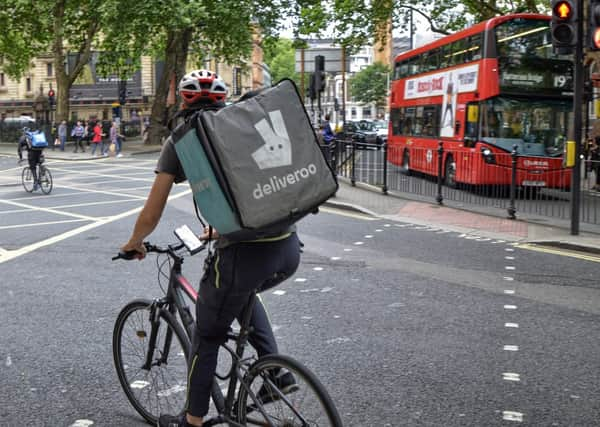Deliveroo and UberEats couriers say they aren't being treated like key workers - facing low pay and poor conditions


Delivery couriers across the UK are calling for better rights at work, after many have effectively lost their jobs without any due process during the Covid pandemic.
App-based couriers say they face low rates of pay and constant precarity, as they can be sacked without a dismissal process at any time.
Advertisement
Hide AdAdvertisement
Hide AdWorkers say they have lost their jobs over delivery delays which weren’t their fault and issues with facial recognition software.
‘We’re frontline key workers’
Well known food delivery companies like Deliveroo and UberEats have kept staff operating throughout the pandemic, designating them as key workers, as they deliver food and also now medical supplies and groceries.
Cristian - a member of the Independent Workers of Great Britain Union, who works as a courier for a number of app-based firms - claims these companies are failing to recognise the role they are playing.
“We’re frontline key workers. We’re now delivering from pharmacies, plus essential groceries and hot food to people who can’t leave their homes,” he said.
Advertisement
Hide AdAdvertisement
Hide AdHowever, this key worker status has not offered delivery app workers any greater protections from dismissal, with workers reporting being barred from the platforms - akin to being sacked - with little warning.
‘Presumption of guilt’
Being barred can often occur over issues which are not a delivery worker’s fault, according to Cristian. He was temporarily barred from one platform after he shaved his beard for a job interview, only for the app to think he was trying to cheat the system by letting someone else use his device.
Other problems which have led to workers being dismissed include recipients of the deliveries taking too long to accept the order, or fraudulently claiming that they had not received it.
“There is a presumption of guilt on the courier,” said Cristian.
Advertisement
Hide AdAdvertisement
Hide Ad“We aren’t supported at all, or given any opportunity to explain our side of issues.”
Workers also report their levels of pay are well below minimum wage, especially after expenses and tax contributions are deducted, due to the payment model of ‘pay per delivery’.
There is currently no dismissal process in place for delivery app workers, meaning they can be barred from work without any opportunity to offer explanations for alleged issues.
Couriers and Logistics Branch Chair for the IWGB, Greg Howard, said: “Gig economy corporate giants have made record profits through this pandemic while denying their workers basic rights. That’s business as usual. What’s changed is public opinion.
Advertisement
Hide AdAdvertisement
Hide Ad“The whole country came out to clap these guys when the crisis started and I think it’s obvious to everyone now that these workers do matter, that everyone on our frontline is essential and that essential workers deserve essential rights.
“We can’t ever go back to the days of sub-minimum wage pay, of workers being terminated without due process - often without so much as a single conversation with an actual human being.
“We won’t stand for workers being forced to choose between self-isolating when they get sick or losing the roof over their heads.”
Are app-based couriers employees?
Workers who do delivery work for apps like Deliveroo, Uber Eats and Stuart are not contracted workers, but instead log in to apps on their smartphones to carry out work on a casual basis.
Advertisement
Hide AdAdvertisement
Hide AdWhile some couriers do this work part-time, a significant number rely on these jobs for their primary source of income.
A number of app-based courier firms have been involved in legal disputes regarding the legal classification of their workers and what rights they are entitled to.